Research Questions
The TLC3 study will answer the following guiding research questions.
- What types of programs, structures, and instructional strategies are community colleges currently implementing in the Developmental to Pre-calculus to Calculus II sequence?
- What are the effects (if any) of these programs, structures, and instructional strategies on URM students’ success in the Developmental to Pre-calculus to Calculus II sequence?
TLC3 Publications
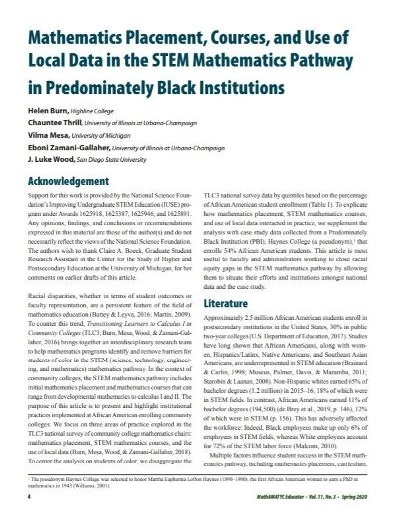
Mathematics Placement, Courses, and Use of Local Data in the STEM Mathematics Pathway in Predominately Black Institutions
This article focuses on mathematics placement, STEM mathematics pathway courses, and the use of local data, all factors that can have a disproportionate impact on students of color.
June 2020
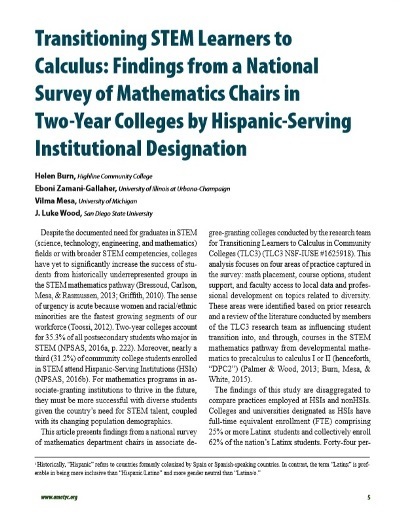
Transitioning STEM Learners to Calculus: Findings from a National Survey of Mathematics Chairs in Two-Year Colleges by Hispanic-Serving Institutional Designation
This article presents findings from a national survey of mathematics department chairs in associate degree-granting colleges, disaggregated by Hispanic-serving institutional (HSI) status.
March 2019
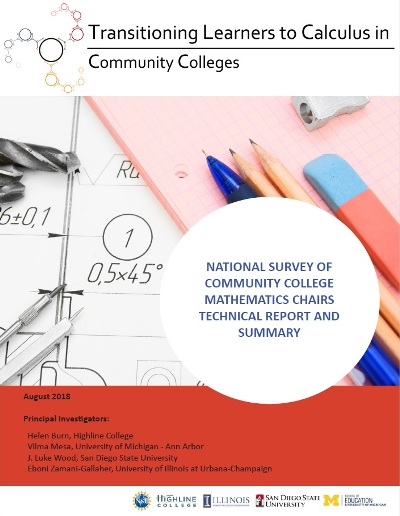
National Survey of Community College Mathematics Chairs Technical Report and Summary
This report focuses on a national survey of community college mathematics department chairs conducted by the TLC3 research team during 2017 (TLC3 National Survey).
August 30, 2018
TLC3 Resources

TLC3 Institutional Self-Assessment Tool for Equity Practices in the STEM Math Pathway
TLC3 acknowledges the mathematics of curriculum as a white space that contributes to inequitable educational outcomes for racially minoritized students, particularly for underrepresented racially minoritized (URM) students seeking degrees in science, technology, engineering, and mathematics (STEM). Discover the TLC3 Institutional Self-Assessment Tool, which provides a validated set of practices that can be used to identify and remove barriers for URM students in the areas of initial math placement, STEM math pathway courses, instruction, student support, and institutional responsibility.
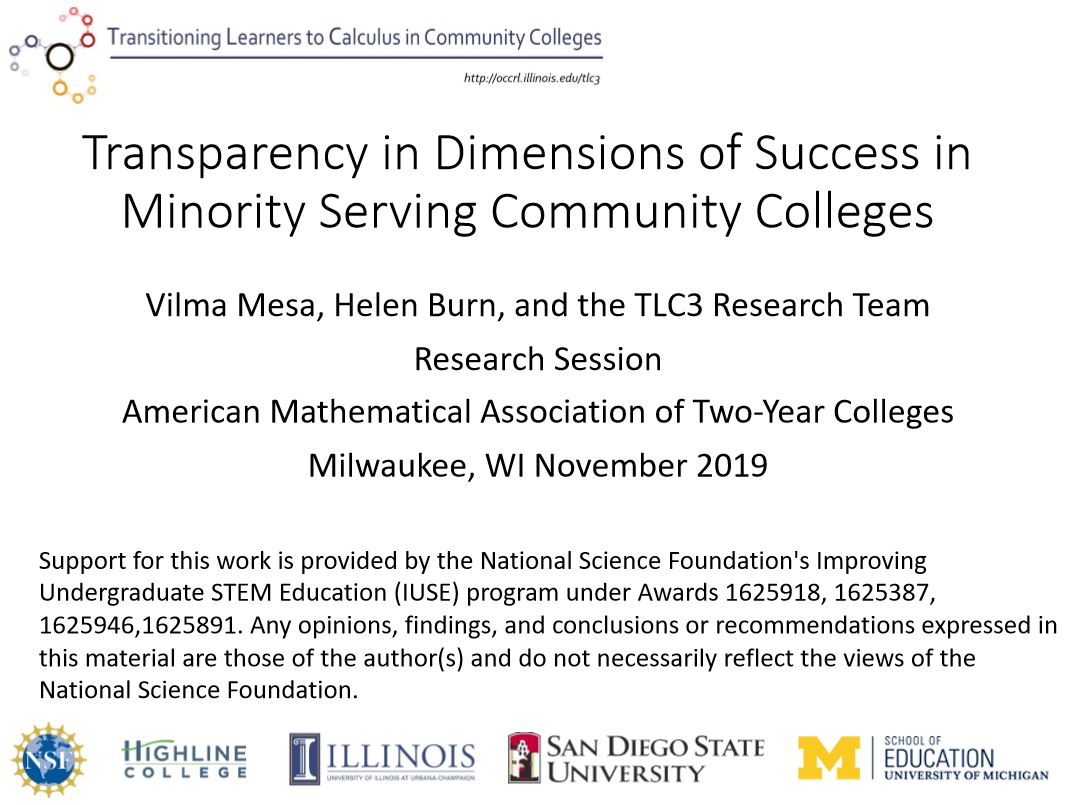
Transparency in Dimensions of Success in Minority Serving Community Colleges
Presented at the 2019 American Mathematical Association of Two-Year Colleges
November 2019
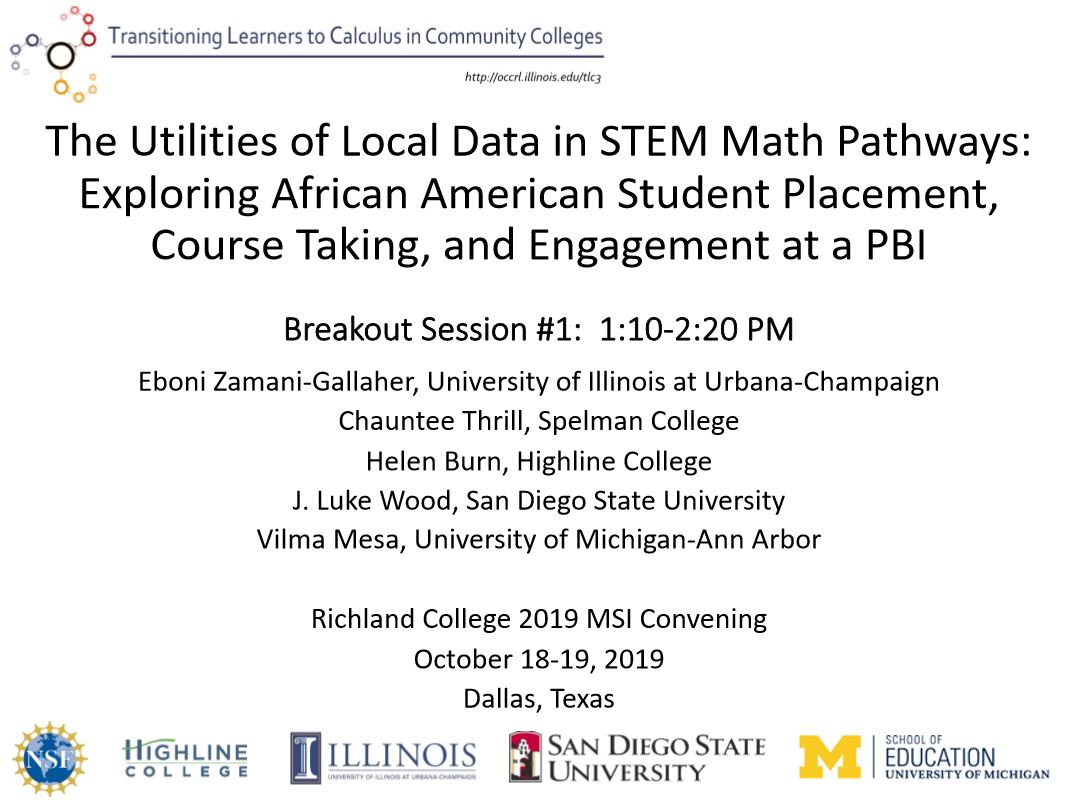
The Utilities of Local Data in STEM Pathways: Exploring African American Student Placement, Course Taking, and Engagement at a PBI
Presented at the 2019 Richland College MSI Convening
October 18-19, 2019
Mathematics as Whiteness: Deconstructing Interest Convergence and Institutional Culture in Community Colleges
Presented at the 2019 Council for the Study of Community Colleges Conference
March 28-30, 2019
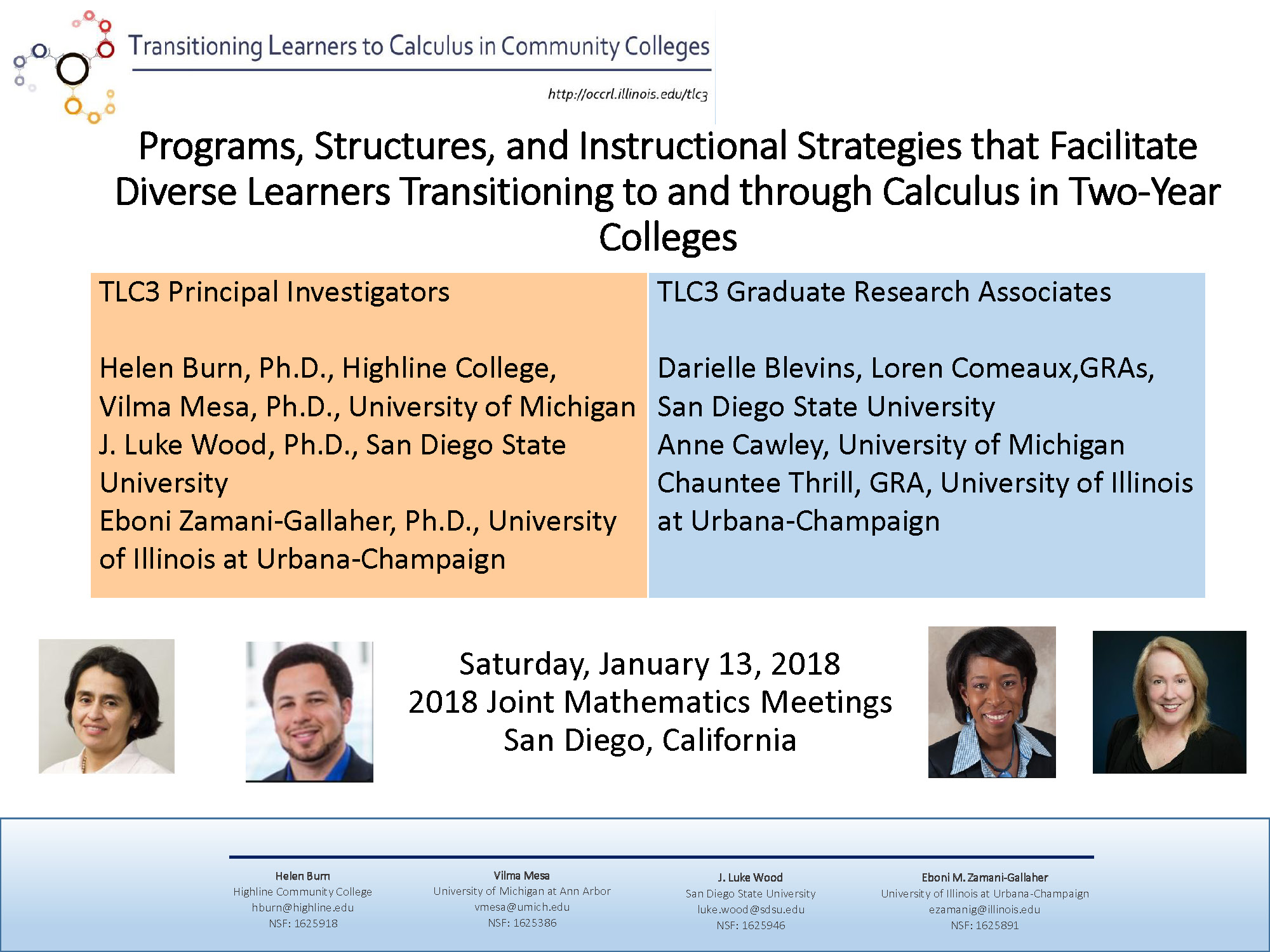
Programs, Structures, and Instructional Strategies that Facilitate Diverse Learners Transitioning to and through Calculus in Two-Year Colleges
Presented at the 2018 Joint Mathematics Meetings San Diego, California
January 13, 2018
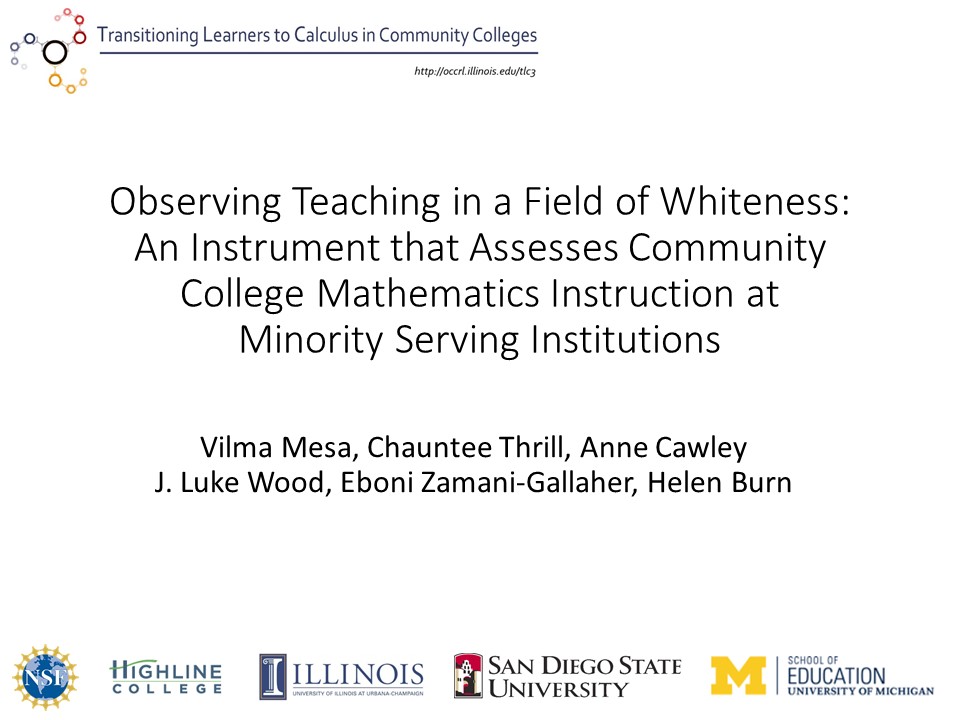
Observing Teaching in a Field of Whiteness: An Instrument that Assesses Community College Mathematics Instruction at Minority Serving Institutions
Presented at the Association for the Study of Higher Education
November 16, 2018
TLC3 Podcasts

Dr. Ann Edwards
Curricular Readiness in Math and Curricular Alignment
In this episode, OCCRL Director Eboni Zamani-Gallaher talks with Dr. Ann Edwards about college readiness in math and about curricular alignment. They also discuss issues related to placement and developmental mathematics courses, guided pathways, math pathways, and student participation in STEM.

Dr. Asif Wilson
Asset Based Approaches to Developmental Education
Episode 27, February 12, 2019
In this episode, Chauntee Thrill at OCCRL talks with Dr. Asif Wilson, associate dean of instruction at Harold Washington College, about asset-based approaches to developmental education.

Dr. Tatiana Melguizo
Equity-Minded Approaches to Mathematics Education
Episode 21, August 21, 2018
In this episode, Dr. Vilma Mesa, Associate Professor of Education at the University of Michigan, talks with Dr. Tatiana Melguizo, Associate Professor at the University of Southern California, about equity-minded approaches to mathematics education.
Additional Resources:

Dr. Jennifer Banks
Responsive Mathematics Pedagogy
Episode 16, March 14, 2018
In this episode, Chauntee Thrill, from OCCRL, talks with Dr. Jennifer Banks, Coordinator of Mathematics and Science at Washtenaw Intermediate School District, about responsive mathematics pedagogy.

Dr. George Reese
Equity in Mathematics Education
Episode 14, January 17, 2018
In this episode, Dr. Eboni M. Zamani-Gallaher from OCCRL talks with Dr. George Reese the director of Office for Mathematics, Science, and Technology Education at the College of Education at the University of Illinois at Urbana-Champaign about equity in mathematics education.
Additional Resources
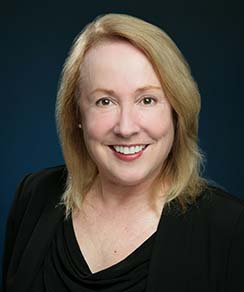
Dr. Helen Burn
Equity-Minded Approaches to Mathematics Education
Episode 8, July 19, 2017
In this episode, Dr. Heather Fox from OCCRL talks with Dr. Helen Burn, a mathematics professor and Director of the Curriculum Research Group at Highline College, about equity-minded approaches to mathematics education.
View Dr. Burn's curriculum vitae to learn more about this topic. For all OCCRL podcasts, please visit the Democracy's College page.
TLC3 Webinar
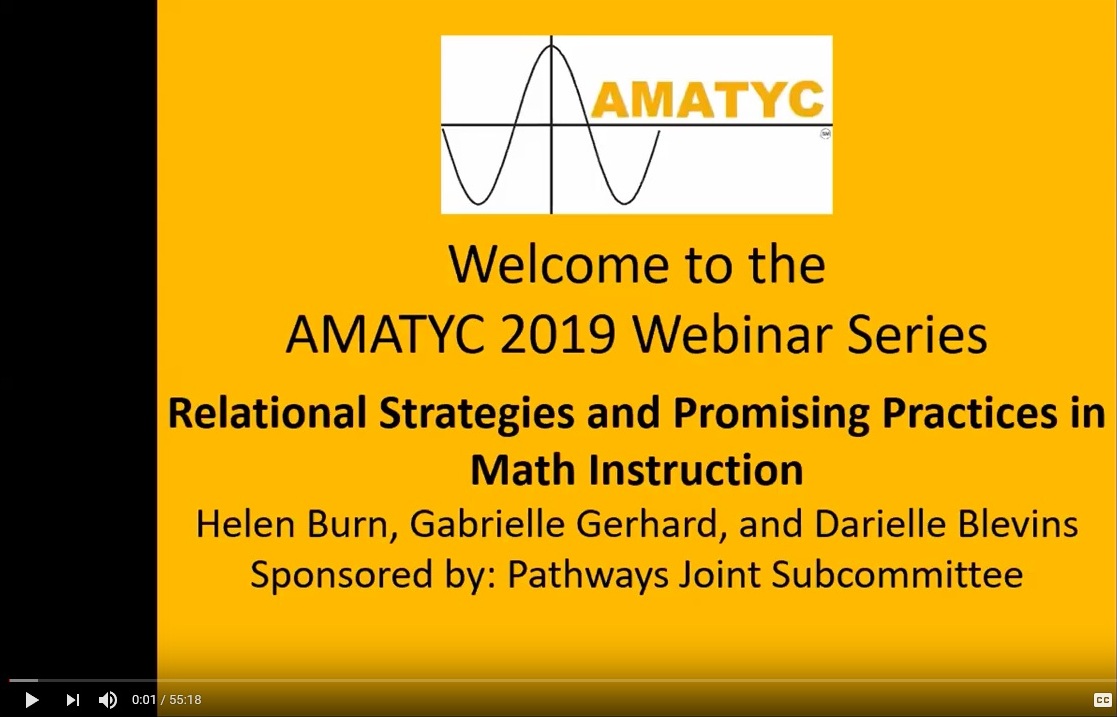
Relational Strategies and Promising Practices in Math Instruction
Presented March 4, 2019
Relational strategies and promising practices such as validation, reception, appropriate disclosure, cultural relevance, and performance monitoring can improve the success of historically underserved or underrepresented students in your classroom (Wood, Harris III, and White, 2015). This webinar explains these practices and provides examples of how faculty of four Minority-Serving Community Colleges incorporated them in classrooms observed in the Transitioning Learners to Calculus in Community Colleges project (NSF IUSE 1625918). The webinar will be of most interest to mathematics instructors, but the content is also relevant to anyone who mentors mathematics faculty or offers faculty professional development.
Additional Resource:
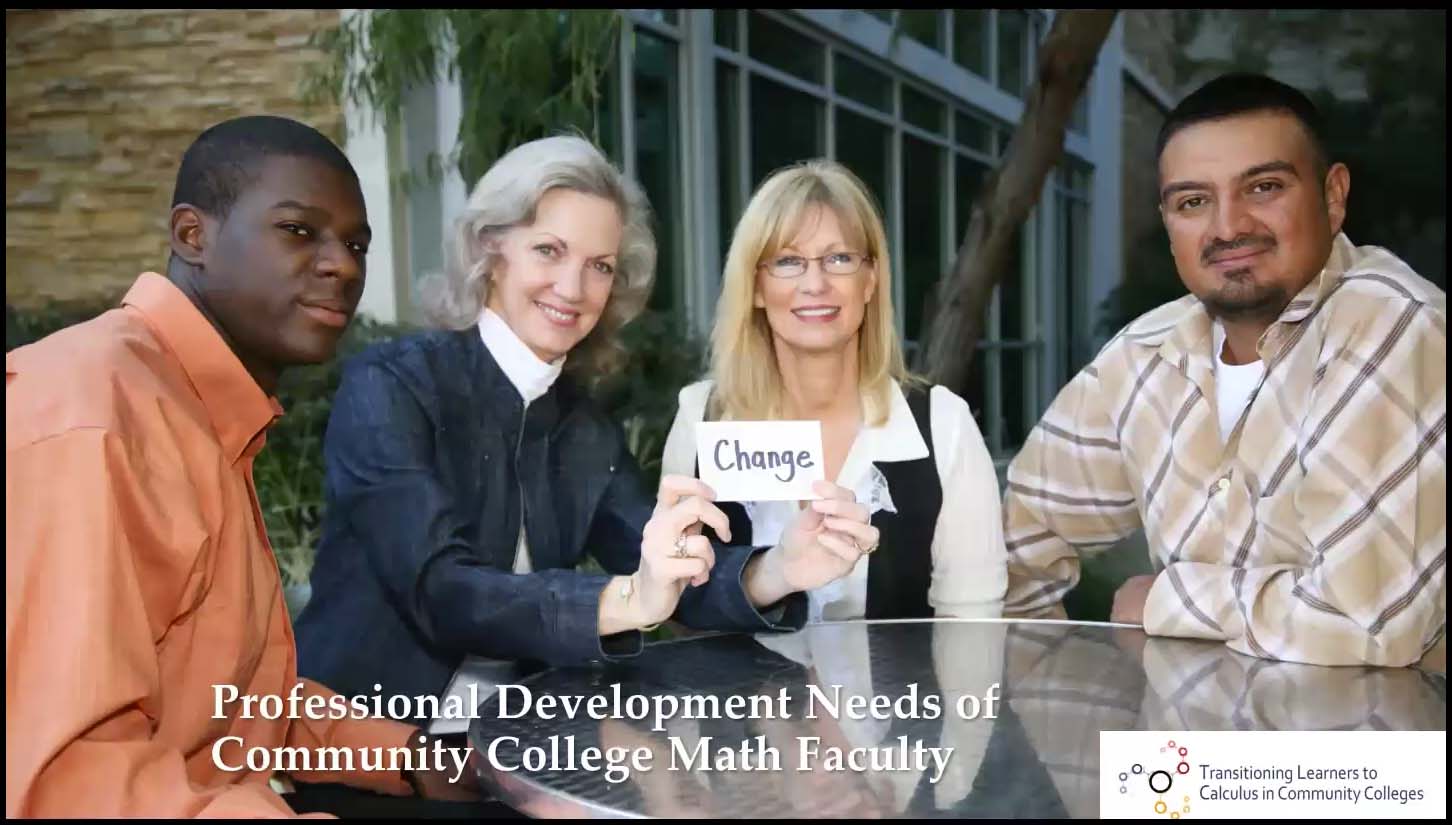
Professional Development Needs of Community College MathFaculty
Presented September 13, 2017
This webinar presents findings from a recent analysis of professional development needs among community college math faculty. Data in this presentation was derived from the Community College Instructional Development Inventory (CCIDI). This inventory is designed to identify areas in need for professional development for college faculty. A special sampling of the CCIDI was conducted as part of the Transitioning Learners to Calculus (TLC3) grant funded by the National Science Foundation (NSF). This webinar focused on a subset of data that addresses the unique disciplinary needs for professional development in mathematics that can improve educational outcomes for underserved students of color.
Support for this work is provided by the National Science Foundation's Improving Undergraduate STEM Education (IUSE) program under Awards 1625918, 1625387, 1625946, 1625891. Any opinions, findings, and conclusions or recommendations expressed in this material are those of the author(s) and do not necessarily reflect the views of the National Science Foundation.


